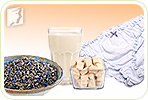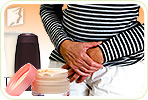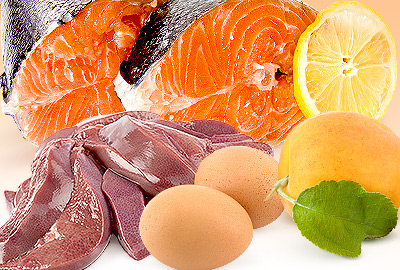While vaginal dryness affects up to 60% of menopausal women, only one in four receives the care she needs.1 The rest suffer from dryness, painful sex, and other symptoms of vaginal atrophy, while effective treatments are within reach.
Read on to discover the best treatments for vaginal dryness to bid farewell to your discomforts and take back control over your intimate life for years to come.
Three Approaches to Treating Vaginal Dryness
Women looking to treat vaginal dryness have three levels of approaches at their disposal: (1) Lifestyle Changes, (2) Alternative Medicine, and (3) Medications. Because the first two constitute more natural methods, women are generally encouraged to begin with them and only move to the third tier when necessary.
Lifestyle Changes for Vaginal Dryness

Making healthier lifestyle choices can be of tremendous help when it comes to treating vaginal dryness. While free from side effects, they do require the most self-discipline and will power.
Nutritious Diet
Though research on specific foods that might help treat vaginal dryness is scarce, a diet focused on promoting hormonal balance and boosting immunity can be highly beneficial. As such, women should build their meals with healthy fats, complex carbohydrates, and lean protein, which are rich in the following nutrients:
- Phytoestrogens mimic the body's own estrogen, thus promoting hormonal balance and reducing vaginal dryness.
Soy, wild yams, apples, broccoli, oats
- Fatty acids, which are used by the body to make hormones and support their functions, may also help lubricate the vagina and treat vaginal dryness.2
Oily fish, nuts, flax, sacha inchi seeds, sea buckthorn oil
- Probiotics help maintain healthy bacterial flora and pH in the body, including thevagina, to fight off infections, which could further compromise vaginal health.
Plain yogurt, kimchi, kefir, kombucha
- Insulin-regulating foods may help prevent insulin resistance, which is a recognized cause of hormonal imbalance.3
Quinoa, oats, whole-grain pasta, brown rice
While proper hydration is key for all women, those with vaginal dryness should pay special attention to adequate water intake to keep their body well-nourished and help relieve symptoms.
Regular Exercise
Staying physically active on a regular basis can not only improve mood, boost immunity, and strengthen the body, but it can also be highly beneficial for a woman's intimate comfort and pleasure.
Amount: A good goal to work towards is 150 minutes of low- to moderate-level exercises per week, broken up into 30-minute workouts five times a week.
Type: Pelvic floor exercises, or Kegels, are one of the best workouts for vaginal dryness treatment as they relax tight vaginal muscles, strengthen pelvic floor muscles, increase blood flow to the area, and improve lubrication.4
Useful Tips: Choosing loose, breathable workout clothes can help prevent irritation in the vaginal area.
Precautions: To prevent contusions or further discomforts, women should avoid strenuous workouts, like endurance training, especially those in postmenopause who are at a higher risk of osteoporosis.
Wholesome Habits
While eating right and staying active can be of great help, the addition of wholesome habits can make all the difference in treating vaginal dryness quickly and effectively. They are as follows:
- Regular vaginal stimulation is perhaps the best natural way to treat vaginal dryness as it promotes blood flow to genitalia and stimulates lubrication.
- Frequent sex helps keep the vaginal tissue naturally moist and more elastic.
Sex toys or masturbation can be used instead of penetrative sex.
- Natural vaginal products can help moisturize the vaginal tissue and make sex less painful and more pleasurable.
- Vaginal lubricants are used right before or during sex to reduce discomforts.
- Oil-based vaginal products can degrade the latex in condoms.
- Applying chamomile vaginal gel reduces painful sex as well as estrogen gel.5
- Vaginal moisturizers are every few days to keep the vagina moist.
Scented soaps, bubble baths, and douches should be avoided.
Open communication with one's partner is key to finding long-lasting vaginal dryness treatment, while respecting and fulfilling each other's needs and avoiding unnecessary tension.
Alternative Medicine for Vaginal Dryness

Alternative approaches can be a highly effective method of treating vaginal dryness. They are easy to follow, involve little to no risk, and constitute the only alternative option to treat hormone imbalance directly at its core.
There are two types of herbal supplements that might be beneficial in the treatment of vaginal dryness, including:
Phytoestrogenic supplements
Phytoestrogenic supplements, such as ginseng and black cohosh, contain compounds, called phytoestrogens, which mimic the function of estrogen when introduced into the body. As a result, they help resolve hormonal imbalance, thus relieving vaginal dryness. However, because introducing outside hormones might make the body less capable of producing its own, thus further worsening hormonal imbalance, these supplements are best for short-term use.
Hormone-regulating supplements
Hormone-balancing supplements, unlike those containing phytoestrogens, do not supply the body with outside hormones. Instead, they stimulate the endocrine glands to balance their own hormone production and relieve symptoms of an imbalance. Because the body makes hormones naturally rather than using external ones, hormone-regulating supplements, such as Macafem, are considered to be a safe and effective way to treat vaginal dryness.
From Nature and Health Magazine, Dr. Gloria Chacon says:
"Macafem's nutrients help restore natural hormones in women. Unlike hormone drugs, which are basically resumed in taking synthetic hormones, Macafem acts totally different in your body. It nourishes and stimulates your own natural hormone production by inducing the optimal functioning of the pituitary and endocrine glands." Click on the following link to learn more about Macafem.
A combination of lifestyle changes with herbal supplements is typically the most natural and effective vaginal dryness treatment. However, women might suffer from severe symptoms that call for more advanced and risky approaches, such as medications and surgery.
Medications for Vaginal Dryness

The third level of vaginal dryness treatments typically comes with the highest risks and costs. As such, it is important to carefully evaluate a woman's symptoms and potential side effects to ensure they will not further compromise her health.
The most commonly used medications for menopausal vaginal dryness include the following:
Hormone Replacement Therapy (HRT)
HRT was once the most popular treatment for vaginal dryness and other menopause symptoms. As the name suggests, HRT contains hormones - mainly estrogen, progesterone, or their combination - that replace those missing in the body, thus quickly and effectively relieving hormonal imbalance symptoms. However, systemic HRT does not come free from side effects, which - as shown in the studies below - might put women at a higher risk of serious health complications.
Other Medications for Vaginal Dryness
Besides systemic HRT, other prescription medications might be beneficial in vaginal dryness treatment, such as:
Low-dose vaginal estrogen in a cream, tablet, or ring form is an alternative to oral estrogen treatment that may carry a lower risk of side effects since it acts locally and is only minimal absorbed into the bloodstream.8
DHEA (Dehydroepiandrosterone) vaginal suppository might be a more appropriate option for women who cannot take estrogen.
Ospemifene is an oral medication whose mechanism of action is similar to that of estrogen and might be an option for women who do not want to use vaginal medications.
These three levels of vaginal dryness treatment can be combined or used separately according to the severity and duration of symptoms. However, women nowadays opt for natural means of combating their symptoms, namely lifestyle changes and herbal supplements, to avoid the risks involved with conventional treatments.
A Safe Treatment for Vaginal Dryness
Implementing Lifestyle Changes:
- Eating a diet with foods rich in phytoestrogens and fatty acids
- Practicing pelvic floor muscles exercises regularly
- Performing frequent sex or other forms of vaginal stimulation
- Using natural products, such as lubricants or moisturizers
And Taking Herbal Supplements:
- Phytoestrogenic herbal supplements, like black cohosh or red clover
- Or natural hormone-regulating supplements, like Macafem
Sources
- Bachmann, G. & Santen, R. (2020). Patient education: Vaginal dryness (Beyond the Basics). Retrieved February 13, 2020 from https://www.uptodate.com/contents/vaginal-dryness-beyond-the-basics
- Cleveland Clinic. (2018). Vaginal Dryness: Care and Treatment. Retrieved February 13, 2020 from https://my.clevelandclinic.org/health/symptoms/21027-vaginal-dryness/care-and-treatment
- Harvard Health Publishing. (2019). Managing postmenopausal vaginal atrophy. Retrieved February 13, 2020 from https://www.health.harvard.edu/womens-health/managing-postmenopausal-vaginal-atrophy
- Mayo Clinic. (2018). Vaginal dryness after menopause: How to treat it? Retrieved February 13, 2020 from https://www.mayoclinic.org/vaginal-dryness-after-menopause/expert-answers/faq-20115086
- NHS. (2018). Vaginal dryness. Retrieved February 13, 2020 from https://www.nhs.uk/conditions/vaginal-dryness/
- The North American Menopause Society. (2018). Vaginal Dryness. Retrieved February 13, 2020 from https://www.menopause.org/docs/default-source/for-women/mn-vaginal-dryness.pdf
Footnotes:
- International Journal of Women's Health. (2018). Current treatment options for postmenopausal vaginal atrophy. Retrieved February 13, 2020 from https://www.ncbi.nlm.nih.gov/pmc/articles/PMC6074805/
- Maturitas. (2014). Effects of sea buckthorn oil intake on vaginal atrophy in postmenopausal women: a randomized, double-blind, placebo-controlled study. Retrieved February 13, 2020 from https://www.ncbi.nlm.nih.gov/pubmed/25104582
- Cleveland Clinic. (2015). Your Blood Sugar Mat be the Key to Your Hormone Imbalance. Retrieved February 13, 2020 from https://health.clevelandclinic.org/polycystic-ovary-syndrome-pill-not-remedy/
- Memorial Sloan Kettering Cancer Center. (2018). Pelvic Floor Muscle (Kegel) Exercises for Women to Improve Sexual Health.
- Avicenna Journal of Phytomedicine. (2020). Evaluation of the influence of chamomile vaginal gel on dyspareunia and sexual satisfaction in postmenopausal women: A randomized, double-blind, controlled clinical trial. Retrieved November 23, 2020 from https://www.ncbi.nlm.nih.gov/pmc/articles/PMC7508318/
- JAMA. (2002). Risks and benefits of estrogen plus progestin in healthy postmenopausal women: principal results from the Women's Health Initiative randomized controlled trial. Retrieved February 13, 2020 from https://www.ncbi.nlm.nih.gov/pubmed/12117397
- The Lancet. (2019). Type and timing of menopausal hormone therapy and breast cancer risk: individual participant meta-analysis of the worldwide epidemiological evidence. Retrieved February 13, 2020 from https://www.thelancet.com/journals/lancet/article/PIIS0140-6736(19)31709-X/fulltext
- PLOS. (2019). Topical treatment of vaginal dryness with a non-hormonal cream in women undergoing breast cancer treatment - An open prospective multicenter study. Retrieved February 13, 2020 from https://www.ncbi.nlm.nih.gov/pmc/articles/PMC6345451/



